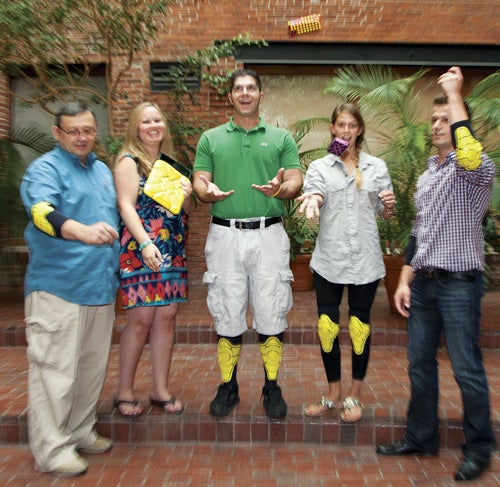Throw your iPhone, We Dare You

Going to Extremes for the Rhode Island Economy.
What do pro BMX rider Lee Dennis and many iPads® have in common? G-Form protection. If that answer was not obvious, it soon will be.
Based in Providence, G-Form is a rapidly growing startup company that manufactures protective padding for athletes and consumer electronics. Among the 40 employees in the company’s home office are six URI graduates: Meghan S. Downing ’04, assistant to the CEO; Daniel Chapman ’81, VP of operations; David Gentile ’01, M.B.A. ’08, accounting manager; Ervin Hamzo ’11, buyer/planner; Sara Duphily ’11, customer service representative; and Adam Millard ’11, facilities manager.
These and other jobs filled by area graduates benefit Rhode Island, particularly at a time of double-digit unemployment. As the resultant brain drain adversely affects the labor pool, Downing spreads the word about G-Form through a LinkedIn network of URI graduates.
Founded in 2010 by cycling enthusiasts who endured their fair share of bruises, G-Form produces kneepads, crash shorts, protective compression shirts, and related products using Reactive Protective Technology—or RPT™—a blend of its own proprietary materials with PORON® XRD™ impact protection foam. Due to this unique composite, RPT products absorb 90 percent of force upon impact.
For its revolutionary technology and marketplace success, G-Form was one of ten winners (chosen from 268 nominations) to receive the Smaller Business Association of New England’s 2012 Innovation Award.
Professionals and weekend warriors alike laud G-Form’s equipment for its ability to protect them without interfering with their performance. “It was really nice to have flexible [knee] pads,” says free-line skater Ryan Farrelly. “I even drove all the way home with them on—I forgot they were there.”
Comments like Farrelly’s demonstrate that the company founders achieved their objective of developing products from the athlete’s point of view: “Athletes resist using protective gear because it doesn’t look cool, doesn’t work, or gets in the way,” says G-Form President Danny Warshay. “We address these concerns by creating low-profile, comfortable products that conform to your body shape. They are soft except when they’re impacted.”
Out of curiosity, Warshay and his partners decided to apply this soft-yet-protective philosophy to consumer electronics: “We sandwiched an iPad between kneepads and dropped a bowling ball on it. The iPad survived unscathed.”
From this experiment, the G-Form Extreme Sleeves™ for iPhones, iPads, and laptops were born. To market these products, G-Form executives recreated the bowling ball drop using a finished sleeve and filmed it for YouTube. As that video grew in popularity, the team created another, showing how a protected iPad sustained no damage after being dropped by a skydiver 1,300 feet above ground.
These videos attracted close to a million views, creating world-wide attention. Now in its third year of operation, G-Form utilizes 26 international distributors, and the company’s products are available throughout Asia, Australia, Europe, and Latin America. In the United States, Best Buy and Staples began carrying the iPad and iPhone sleeves last summer. Presence in these mainstream chain retailers has helped strengthen G-Form’s brand recognition.
When you join a start-up company, your career path can take you rapidly to unexpected places. Before graduating from URI, Adam Millard joined G-Form as a sales intern. “G-Form was in its infancy and had few systems in place. We fulfilled orders from a barn,” relates Meghan Downing. “Adam has a hands-on mentality, and he … ended up jumping in and helped with packaging and shipping.” Today, as facilities manager, Millard expedites the flow of materials among factories in G-Form’s supply chain.
Like Millard’s, Downing’s path to and at G-Form has been circuitous. She was working for the Leukemia & Lymphoma Society when she found herself participating in a 100-mile fundraising bike ride around Lake Tahoe with G-Form executives: “I got to know CEO Dan Wyner because he was on the Leukemia & Lymphoma Society board, and I reached out to him for advice when I was contemplating a career change.
“Because my background was in nonprofits, I didn’t know if I’d fit into the corporate world. Dan suggested that my skills would transfer successfully to G-Form, and I‘ve never looked back. I’ve been involved in various aspects of the business from customer service to operations to sales and marketing. I’m open to whatever needs to get done.”
G-Form is doing its part to boost the regional economy. “Rhode Island is a great place to be,” says Warshay. “We’re responsible for more than 300 jobs in G-Form’s orbit. Our fabrics are sourced here and our molds are produced here. Laminates and film are made in Massachusetts. A Connecticut company makes the chemicals, and we use a factory in Fall River for cutting, sewing, and fulfillment. Experienced factory workers in Fall River were teary-eyed when they were hired; they never dreamed they’d be working in textiles again. Keeping our supply chain in close proximity is advantageous. We can produce our prototypes and products quickly and get them to market rapidly.”
The company is expected to have an even greater impact on the local job market as the product line expands. “We’re focused on generic body parts—elbows, knees, shins—but we recognize that the lacrosse player is different from the cyclist,” says Warshay. “Our next phase is to start targeting various sports.
“The military is also a growing market for us. Currently, they’re deploying standard iPads into the field using existing sleeves. They also have to protect front-line soldiers, so they have very high standards. We’re working with an R & D expert from the Naval War College to help us develop customized applications.”
G-Form has grown tremendously since its humble beginnings. As it pursues these opportunities and other promising, untapped markets, its prospects for growth are extraordinary, and URI alumni are proud to be a part of it.
By Maria V. Caliri ’86, M.B.A. ’92
 Home
Home Browse
Browse Close
Close Events
Events Maps
Maps Email
Email Brightspace
Brightspace eCampus
eCampus


